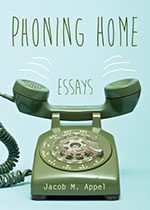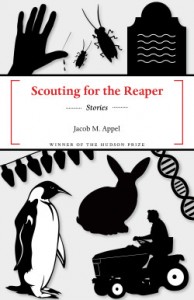Book Review
Jacob Appel has been very, very busy. In his early forties, Appel is a lawyer. And a doctor. And a medical ethicist. And, oh yes, according to his author bio, he’s also published more than two hundred stories, collecting numerous writerly awards and accolades along the way. In the last three years alone, he’s released six books: four story collections, a book of essays, a mystery novel, and a literary novel. His novel, The Biology of Luck (Elephant Rock Books, 2013), was reviewed by David Bowen for Colorado Review last summer. All of this accomplishment and productivity are impressive (does he sleep?!), but when three of his latest books accumulated, one-by-one, on my editorial desk, I wondered whether quantity had managed to trump quality. I am delighted to report that it has not. Phoning Home: Essays, Einstein’s Beach House: Stories, and Scouting for the Reaper are a treasure trove of the ordinary metamorphosed into the extraordinary. Appel proves himself, three times over, to be an entertaining, intelligent, and offbeat storyteller.
In Phoning Home, A ppel narrates his own childhood and events from his relatives’ lives with honesty and humor, while also raising thought-provoking questions of, literally, life and death. Appel grew up in a well-to-do suburb of New York City. His father and maternal grandfather were both doctors; his paternal grandfather escaped Nazi persecution in Antwerp to settle with his family in the Bronx. Appel’s exploration of his grandparents’ and other older relatives’ lives is equal parts love and psychological analysis. In “Mr. Odd and Mr. Even,” for example, Appel tells how his paternal grandfather, with whom Appel had a close relationship, developed a life philosophy of “Never, ever, stick your neck out” because of a childhood fraught with anti-Semitism in pre-war Europe. With his usual dry humor Appel says: “That’s probably good advice when you’re hiding from a mob of middle-class churchgoers lobbing stones, but my grandfather applied it universally.” In contrast, his maternal grandfather, Grandpa Jimmy, who died before Appel was born, “made a point of sticking his neck out as far as his tiny, rounded shoulders would permit.” For Appel, these contrasting philosophies haunted him when deciding whether or not to pursue his original passion, writing.
ppel narrates his own childhood and events from his relatives’ lives with honesty and humor, while also raising thought-provoking questions of, literally, life and death. Appel grew up in a well-to-do suburb of New York City. His father and maternal grandfather were both doctors; his paternal grandfather escaped Nazi persecution in Antwerp to settle with his family in the Bronx. Appel’s exploration of his grandparents’ and other older relatives’ lives is equal parts love and psychological analysis. In “Mr. Odd and Mr. Even,” for example, Appel tells how his paternal grandfather, with whom Appel had a close relationship, developed a life philosophy of “Never, ever, stick your neck out” because of a childhood fraught with anti-Semitism in pre-war Europe. With his usual dry humor Appel says: “That’s probably good advice when you’re hiding from a mob of middle-class churchgoers lobbing stones, but my grandfather applied it universally.” In contrast, his maternal grandfather, Grandpa Jimmy, who died before Appel was born, “made a point of sticking his neck out as far as his tiny, rounded shoulders would permit.” For Appel, these contrasting philosophies haunted him when deciding whether or not to pursue his original passion, writing.
. . . I carry them both with me, tugged now one way by the man who took part in nearly every event of my life, now the other way by a man who never experienced any of them. Maybe that is the greatest of wonders: that we can be shaped so much by those we’ve known closely, and equally by those we’ve never known at all—and that we too can change the world long after we’ve left it.
Appel’s epiphany applies equally well to his own life, in which his diverse work has changed not only the lives of people he knows intimately, but also those he knew only briefly or not at all, like those of his hospital patients, or the medical ethics cases he has helped resolve, or the readers of his many stories.
The essays in Phoning Home wander from Appel’s life story to consider philosophical issues that he has encountered in his medical ethics practice. In “Sudden Death—A Eulogy,” Appel argues that a longer life—one extended by medical interventions—is often not a better life. Or in “Opting Out,” he considers a patient’s right NOT to know what ails her. Or in “Charming and Devoted,” Appel learns from his elderly patients that, contrary to his naïve fear, not all patients are “disease-ravaged bodies in . . . death throes,” but also that, no matter how appealing a patient, a doctor must learn to let go, releasing the patient from his sphere of influence.
All of which makes for thought-provoking reading, but the most entertaining essays in the collection concern Appel’s childhood. In the title essay, “Phoning Home,” he unwraps for our pleasure his impish, trickster behavior as a seven-year-old, and in “Two Cats, Fat and Thin,” he confesses his continuing neurotic obsession with two rubber cats. Appel applies the same scrupulous lens to himself as to anyone else, admitting that he has grown into a man with quirks: someone who is still tangled up with the small traumas of his childhood, who still fights the urge to confess pranks to his parents, and who tries in vain to find the chain motel where his toy cats were lost so long ago. Appel’s willing vulnerability, his honesty in admitting his craziness—which, of course, we all share to one degree or another—makes him welcome company.
 After getting to know Appel so well through his essays, it’s an odd sensation to switch to his story collections, for while they are not overtly autobiographical, Appel-cum-puppet-master is clearly visible behind a sheer curtain of narration. Many of the fictional characters, for example, share elements of Appel’s background, including his childhood of suburban ease and Jewish heritage, and his medical expertise. But the similarities with Appel’s reality soon give way to something closer to surreality, in which the normal world these normal people occupy has gone aslant. Such as when an exotic animal appears, as they seem frequently to do in Appel’s stories: a hedgehog that a girlfriend adopts as a surrogate baby, a refrigerated truckload of endangered penguins on their way to a new zoo, or a tortoise in a bizarre custody battle. Appel finds the weird all around us. Would anyone really force his daughter to dress up as a Girl Scout to help him sell tombstones? Well, in the title story, “Scouting for the Reaper,” Appel manages to make the notion both plausible and hilarious:
After getting to know Appel so well through his essays, it’s an odd sensation to switch to his story collections, for while they are not overtly autobiographical, Appel-cum-puppet-master is clearly visible behind a sheer curtain of narration. Many of the fictional characters, for example, share elements of Appel’s background, including his childhood of suburban ease and Jewish heritage, and his medical expertise. But the similarities with Appel’s reality soon give way to something closer to surreality, in which the normal world these normal people occupy has gone aslant. Such as when an exotic animal appears, as they seem frequently to do in Appel’s stories: a hedgehog that a girlfriend adopts as a surrogate baby, a refrigerated truckload of endangered penguins on their way to a new zoo, or a tortoise in a bizarre custody battle. Appel finds the weird all around us. Would anyone really force his daughter to dress up as a Girl Scout to help him sell tombstones? Well, in the title story, “Scouting for the Reaper,” Appel manages to make the notion both plausible and hilarious:
Nothing sells tombstones like a Girl Scout in uniform. This was my father’s pearl of entrepreneurial genius, the closest he ever came to a formal business plan, and it’s how I ended up lugging thirty pounds of granite onto Delia Braithwaite’s front porch, while sporting a pleated skirt, a collared blouse and a trefoil pin.
And this girl isn’t the only one with a kooky, scheming dad. There’s the one who rips off tourists claiming the family beach house once belonged to Einstein, the one who sells elaborate Christmas light displays, and the one who wants his daughters to meet the sex offender who has moved in next door. (I confess, all these quirky dads made me start to wonder if maybe Appel still has a bit more to say about his own father, a man who seemed harmless enough in Phoning Home.)
 Appel’s move toward surreality is a wise choice for characters whose lives might otherwise be considered mundane, as admittedly most of our lives are. Appel asks us to consider these average Joes and plain Janes and ask ourselves: What if something extraordinary happened? And, by extension, what if something extraordinary happened to me, too? And by posing the question, and answering it in simultaneously poignant and humorous ways, Appel lets us behind the obscuring veil of normalcy. These characters just needed to be put in the crucible of the not-so-everyday to reveal their foibles.
Appel’s move toward surreality is a wise choice for characters whose lives might otherwise be considered mundane, as admittedly most of our lives are. Appel asks us to consider these average Joes and plain Janes and ask ourselves: What if something extraordinary happened? And, by extension, what if something extraordinary happened to me, too? And by posing the question, and answering it in simultaneously poignant and humorous ways, Appel lets us behind the obscuring veil of normalcy. These characters just needed to be put in the crucible of the not-so-everyday to reveal their foibles.
We readers are fortunate that the multi-talented and tireless Appel decided to listen to his Grandpa Jimmy after all and stick his neck out, eschewing “the secure life of a physician [for] the equally strenuous, but far more risky, profession of writing.” Well, truth be told, Appel seems to have found a way to listen to both of his grandfathers and do it all, but who’s to quibble?
Appel’s latest story collections, published after the three books reviewed here, are: Miracles and Conundrums of the Secondary Planets (Black Lawrence, 2015), and The Magic Laundry: Stories (Snake Nation, 2015).
About the Reviewer
Jennifer Wisner Kelly’s stories, essays and reviews have appeared in the Massachusetts Review, the Greensboro Review, the Madison Review, Beloit Fiction Journal, and others. She has been awarded residencies by the Ucross Foundation, the Jentel Foundation, the Virginia Center for the Creative Arts, and the Kimmel Harding Nelson Center for the Arts, and is currently at work on a story collection and a novel. Ms. Kelly is a Book Review Editor and an Associate Fiction Editor at Colorado Review. She lives in Concord, Massachusetts.